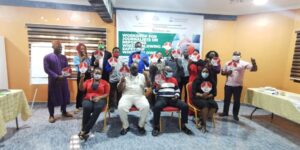The African Centre for Media and Information Literacy (AFRICMIL), on Thursday, trained journalists in Lagos on whistleblower protection in Nigeria.

The programme, put together in collaboration with the Human and Environmental Development Agenda (HEDA), focused on whistle-blowing and whistle-blowers protection in the context of the Nigerian government’s anti-corruption fight.
Speaking at the event, Lanre Arogundade, Director of the International Press Centre (IPC), appealed to the Nigerian government to guarantee the protection of whistle-blowers.

The media rights campaigner said that unless the government provides a legal framework to protect whistle-blowers, many Nigerians may not support the policy and the anti-corruption fight of the government.
He urged the government to uphold its mandate, by paying whistleblowers the percentage it promised them when they submit tips, to encourage more tip-off.
In his welcome address, Chido Onumah, AFRICMIL coordinator, said that the purpose of the training was to promote media and information literacy to enhance democracy, good governance and accountability.
Represented by Kolawole Ogunbiyi, the Programme Manager of AFRICMIL, he said that the organisation’s whistleblowing project was designed to build public confidence and support for the whistle-blowing policy of the government.
Mr Onumah added that the project was also anchored on sensitising the public on the importance of whistle-blowing toward fighting corruption and checking other forms of wrongdoing in the society.
“Following the renewal of the project for another three years, we have added a fourth platform of engagement with the sole objective of working for the institutionalisation of whistle-blowing as a vital mechanism for transparency and democratic good governance in Nigeria,” he said.
As a means to ensure the successful implementation of the project, Mr Onumah noted that AFRICMIL has built strategic alliances with relevant stakeholders such as the Presidential Initiative on Continuous Audit.
“It is in furtherance of deepening this component of activities lined up for this project that this media training is being organised purposely for journalists that we have painstakingly selected from the print and electronic media,” he said.
“AFRICMIL believes that by the nature of its job, journalists are also whistleblowers and so should have as much stake,” he said.
Mr Sulaimon called for a comprehensive whistle-blowing policy and the political will to ensure protection of the whistle-blowers.
AFRICMIL works at the intersection of media, research, training and advocacy.